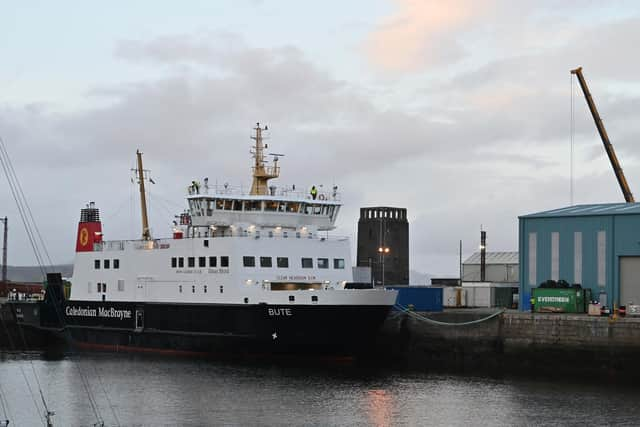Ferries fiasco: CMAL blames FMEL and Ministers for 'catastrophic failure' and 'wasted money'
This article contains affiliate links. We may earn a small commission on items purchased through this article, but that does not affect our editorial judgement.
Senior members of the ferry infrastructure public body, CMAL, told the public audit committee on Thursday they were also concerned the announcement of the yard as preferred bidder, made by Nicola Sturgeon in August 2015, risked the procurement process in its entirety.
They added they were unaware until evidence sessions of the committee that Scottish Government ministers had told Ferguson Marine no builder’s refund guarantee was required for the contract six months before the shipyard was announced as preferred bidder.
Advertisement
Hide AdAdvertisement
Hide AdThe construction of Glen Sannox and hull 802, which are set to operate on the Clyde and in the Hebrides and were initially budgeted at £97 million, is more than five years late and more than £150m over budget.
This additional cost has been met by taxpayers after the contract was awarded to Ferguson Marine without a full builder’s refund guarantee.
A scathing Audit Scotland report said there was not sufficient documentary evidence explaining why ministers considered the financial risk of the contract acceptable and the yard was later nationalised in 2019.
CMAL executives told MSPs they were effectively overruled by ministers on the decision to award the yard the contract and claimed they wanted the tender to be restarted.
They also denied claims made by Transport Scotland that at the point of contract award they were content.


Erik Østergaard, the former chair of CMAL, said “we were not” and that without the financial assurances from the government, CMAL would “not have placed that order”.
He said: “The ministerial approval process was not normal. CMAL made no recommendation to Transport Scotland, to the minister.
"Stating that we were content with the contract is not correct. We were not.”
Advertisement
Hide AdAdvertisement
Hide AdKevin Hobbs, the chief executive of CMAL, said the board was forced to go ahead with the contract award after ministers provided a shareholder instruction to do so.
He said had FMEL been honest about their inability to provide a full refund guarantee, they would have been “redlined and struck out” as with any other bidder failing to do so.
Mr Hobbs said: “What we were seeing when we were doing the assessment was from all the bidders, if they could provide refund guarantees.
"It was only after preferred bidder status was given that all of a sudden the rules were changing in front of our eyes.
"FMEL knowingly and willingly entered into that contract … what we saw in the bid was very, very clear that they could provide what was needed and they made no comment about the fact they couldn’t.”
Mr Østergaard, who now heads up David MacBrayne/CalMac, was also asked whether in his 30 years of experience in shipping he had ever known a ship to be built without a full builder’s refund guarantee.
He said: “Not that I can recollect.”
CMAL was later provided with a letter of comfort confirming the Scottish Government would meet the costs of any overrun and that CMAL would not become insolvent.
Mr Østergaard said it was “obvious” there was a Government interest in FMEL receiving the contract.
Advertisement
Hide AdAdvertisement
Hide AdMorag McNeill, interim chair of CMAL, also told MSPs the announcement of the preferred bidder status of FMEL risked the entire procurement process.
"Our preference was for that to be done on a confidential basis and for there not to be a public announcement,” she said.
"We thought there was risk to the procurement process … and inevitably a negotiation that’s undertaken in a very public domain makes it quite difficult.”
Mr Hobbs was also heavily critical of the quality of management during the construction of the ferries while the yard was owned by Jim McColl.
He said there was a “catastrophic failure of management” and added the decision to launch the Glen Sannox was “absolutely” done too early, adding they warned Mr McColl a launch was “too premature”.
“If you want to follow the money and where has the money gone, the money effectively was wasted,” he said.
Mr Hobbs added: "There has been the rewriting of history in relation to our involvement.
"We don't meddle, we cannot meddle, but of course when something goes catastrophically wrong, it is very, very easy to slope your shoulders and basically blame somebody else.”
Advertisement
Hide AdAdvertisement
Hide AdTransport Scotland later said CMAL’s version of events was not correct.
A spokesperson said: “We do not agree with this interpretation of the process around the award of the contracts or that Mr Brannen’s evidence was not accurate.
“We understand that, some time before the contract award decision, CMAL were not fully content with the contracts and put forward a paper for consideration, outlining potential risks. Ministers provided the assurances that CMAL had sought, and that enabled CMAL to take the decision to proceed. The papers relating to this have been in the public domain since 2019.
“This was referred to in the testimony by Mr Brannen and the former Chair of CMAL, who was also clear that with the wider assurances they were able to proceed with the contract award.”
Want to hear more from The Scotsman's politics team? Check out the latest episode of our political podcast, The Steamie.
It's available wherever you get your podcasts, including Apple Podcasts and Spotify.
Comments
Want to join the conversation? Please or to comment on this article.
